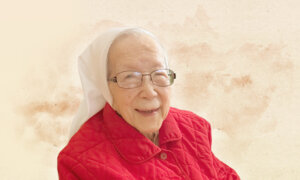This holiday season is as good a time as any to take a risk on social gatherings—perhaps even enjoying parties with people you’ve written off.
Experts say taking it one step further and inviting others to social functions is far less risky than shrinking deeper into isolation.
A large amount of evidence shows cognitive damage and disease risk associated with loneliness. On the other hand, reconnecting with friends and family helps us feel fulfilled and contributes to better health. Regardless of our reasons for avoiding gatherings, experts say isolation is simply not a good strategy.
Instead, we can take steps to embrace community during the holidays, perhaps even facing our own fears of rejection or childhood trauma. Experts offer ways to be surrounded by people even if your childhood home isn’t safe, you have no family, or there’s no event planned this year.
Reaching for Peace
The best reason for making it your goal to be around people who make you feel loved is that it can put your nervous system at ease—the essence of a good celebration, mental health expert and author John Delony told The Epoch Times.
“Community—if it’s a safe community—allows us to exhale and drop our shoulders. It allows us to rest,” he said. “It’s that elusive thing nobody looks for anymore, but everybody wants, and it’s peace.”
While it’s true the season can bring hurt for some—particularly those grieving the loss of a loved one or dealing with family dysfunction—it’s also an angle that tends to get more attention than the profound benefits festivities can bring, according to psychiatrist and author Dr. Drew Ramsey.
“The holidays are generally an emotional time for people,” he told The Epoch Times. “It’s when our isolation and loneliness gets emphasized.”
Isolation is linked not only with a number of mental health conditions such as anxiety and depression, but also with physical conditions such as heart disease, dementia, and stroke, according to an article in JAMA.
A study of 365 Korean university students found executive functioning and attention declined in lonely young adults. Executive function helps with making plans, adapting, and problem-solving.
“Our overall results suggest that young people high in loneliness may be more vulnerable to problems related to impulsive and addictive behaviors,” the study stated.
Losing Connection
Delony said there’s no doubt that withdrawal patterns that began with pandemic lockdowns in 2020 and persisted in an increasingly divisive world are reinforcing isolation society-wide.
Digital communication, while valuable, is no replacement for tangible connection, he said, adding that texting his wife that he loves her isn’t comparable to felt emotion enhanced by eye contact, visual cues, and touch.
“I think we created the loneliest generation in history,” he said. “I don’t think we did it on purpose. I think it was just us trying to do the next right thing.
“Our bodies are regulated with other people in real life. We don’t know how to [do that] anymore. We have a very loud, angry digital ecosphere, and we think it’s going to be like that in real life. It never is.”
Reclaiming Connection
To redeem what’s been lost in connections, you can do something straightforward, albeit difficult. Delony said it requires the vulnerability of asking others to join you. It’s not a moral dilemma but a skill that seems to have gone out of vogue.
At least twice a year on major holidays, Delony and his wife swing open the doors to their home, inviting a wide variety of people they know—something that gets easier with each year.
“My tendency is to turtle up and then I quit exercising,” Delony said. “I quit eating right. It just has a lot of downstream effects.
“It’s bad for me. It’s worse for me than smoking. I know for generations of people, smoking works. It makes you a little bit calm. It relieves tension, and it will kill you. Being alone is similar.”
He shared his step-by-step plan to embrace community for the holiday season, rather than retreat to isolation:
1. Commit to Not Spending the Holidays Alone
“Sometimes that means forgiving mom and dad for childhood stuff or their political opinions or masking and COVID stuff,” Delony said. “Choose connection over small, petty disagreements or drama.”
He said he tells family in advance of gatherings what topics are off-limits during conversations. It’s turned into a family joke, he said, with someone inevitably bringing up politics and someone else quickly interjecting: “Nope, we’re not talking about it. John sent the email out.”
They laugh and move on. The key, he said, is to set boundaries and maximize time together. You can do that by planning activities in advance, such as taking funny photos, doing puzzles together, playing games, or seeing a movie.
If returning to the home you grew up in doesn’t feel safe, you can suggest another location or plan a gathering with people who feel safe.
There are a number of ways to reduce feelings of loneliness, according to JAMA’s resource for older adults dealing with isolation. They also involve being proactive. Some are:
- Make a plan to connect with family, friends, and neighbors, even by phone.
- Attend local events and programs.
- Take classes online.
- Sign up for a group exercise class.
- Volunteer at a local organization.
- Join a support or bereavement group.
- Talk to your doctor about feelings of loneliness.
2. Invite Others First, Even if It Feels Weird
“If you make the declaration that you won’t do the holidays alone but you wait for the invitation, it may not come,” Delony said. “So have the courage to get on the phone, get on email, get on social media, and put something together.”
Delony and his wife never know who might end up at their table for Thanksgiving, Easter, and the occasional random holidays. They both just started inviting people they’ve met over the years, including folks from the comedy club down the road, people they’ve met at concerts, his tattoo artist, people from church, and even musicians from popular bands.
They make their home a relaxing and carefree place for all personality types, even creating spaces for napping and corners where introverts can quietly retreat.
“We are loud and awkward. We’ve got dogs coming and going, and our house ends up a mess. And who cares,” Delony said. “Sometimes people will start texting a few months out and ask if we are hosting again.”
3. Don’t Take Rejection Personally
Not everyone you invite to celebrate with you will say yes. Realize they may have other commitments.
Delony suggested creating a narrative if you aren’t sure why someone can’t make it—or simply accept they must have a lot going on and wish them the best. Never assume they don’t like you or think you aren’t fun to be around. Sinking into assumptions isn’t helpful.
“Intentionally choose to make up a positive story about something rather than a negative one. You get to pick the story you make up,” Delony said. “One story will give you empathy and peace, and one gives you cardiac problems.”
Risking Rejection
Last year, Liberty Hoste took a risk and invited her dad to come to her home on Christmas Day for a few hours to celebrate with her new husband and daughters. Hoste had remarried the year before after six years as a single mom, and though she had asked her dad to walk her down the aisle, he didn’t attend the wedding at all.
There were reasons she was given for his absence, though Hoste said she believed her dad was making excuses because his wife has a history of calling the shots. The woman’s granddaughter had a dance recital the same day.
“I wrote him a letter that I didn’t send, which I think is a great therapeutic idea, especially around this time of the year when you’re facing triggering situations with family or hurtful behavior or unresolved pain,” she said. “I was able to process that emotion and extend forgiveness to my dad, knowing it wasn’t really his heart to not attend my wedding.”
She said she repeatedly clings to a few precious memories from her mostly estranged upbringing with her father and a belief that he cares for her and his granddaughters. She decided it was worthwhile to pursue a restored relationship with him by dropping her own compulsion to be offended.
His response to her Christmas invitation was that he doubted it could work.
“It was what I had feared,” Hoste said. “I hit a swirl of emotion and instead of letting it speak to me that ‘you’re not worth it, he’s not going to fight for you,’ I basically told my husband, ‘I’m going to take a walk.’
“And I walked around my neighborhood like a lost puppy just crying and letting myself say everything I wanted to say to him but in my head. I probably looked like a crazy person, but I did it until I felt a relief.”
She returned home to the conclusion that she was proud of her courage in extending an olive branch and knew her father’s decision had nothing to do with her. Two days later, he called and accepted the invitation.
The visit was short but precious and created a new beginning that she described as giving her a lightness in her chest—mostly because she faced her childhood trauma. The result was personal growth and a renewed relationship with her dad.
“It certainly isn’t rainbows and unicorns, but there is something very powerful and lasting that can happen from a few hours when we do put ourselves out there,” Hoste said. “There is a reward in being able to overcome. I got to create a new story, if not for him, for me.”
Reflecting
Ramsey said the holidays can be a powerful time to reflect on our efforts to tap into human connection. He also advises his patients to hold themselves accountable for building better communities and more connection in their everyday lives.
“That’s the pass forward,” he said, adding that he likes to think of the holidays as special situations football players. Like kickers with a limited appearance on the field yet a profound influence on the game, holidays are a blip on the calendar with big potential to shape our health.
In addition to being a time to double down on basics—lowering stress, getting plenty of sleep, and eating healthy, whole food—it can also be a time to shine with special skills. Among those skills are avoiding common traps that can damage emotional and physical health in lasting ways.
“The main problem in the holidays is there’s a lot of alcohol, and there’s a lot of sugar, and there’s a lack of sleep,” Ramsey said. “That, along with the emotional triggers, kind of creates this perfect storm that helps us understand why ‘new year, new you’ is such a big sell.”














